Hard Times
The American Ways Series

General Editor: John David Smith
Charles H. Stone Distinguished Professor of American History
University of North Carolina at Charlotte
From the long arcs of Americas history, to the short timeframes that convey larger stories, American Ways provides concise, accessible topical histories informed by the latest scholarship and written by scholars who are both leading experts in their fields and polished writers.
Books in the series provide general readers and students with compelling introductions to Americas social, cultural, political, and economic history, underscoring questions of class, gender, racial, and sectional diversity and inclusivity. The titles suggest the multiple ways that the past informs the present and shapes the future in often unforeseen ways.
Current Titles in the Series
How America Eats: A Social History of U.S. Food and Culture , by Jennifer Jensen Wallach
Popular Justice: A History of Lynching in America , by Manfred Berg
Bounds of their Habitation: Race and Religion in American History , by Paul Harvey
National Pastime: U.S. History through Baseball , by Martin C. Babicz and Thomas W. Zeiler
This Green and Growing Land: Environmental Activism in American History , by Kevin C. Armitage
Wartime America: The World War II Home Front, Second Edition , by John W. Jeffries
Hard Times
Economic Depressions in America
Richard Striner
ROWMAN & LITTLEFIELD
Lanham Boulder New York London
Published by Rowman & Littlefield
A wholly owned subsidiary of The Rowman & Littlefield Publishing Group, Inc.
4501 Forbes Boulevard, Suite 200, Lanham, Maryland 20706
www.rowman.com
Unit A, Whitacre Mews, 26-34 Stannary Street, London SE11 4AB
Copyright 2018 by The Rowman & Littlefield Publishing Group, Inc.
All rights reserved . No part of this book may be reproduced in any form or by any electronic or mechanical means, including information storage and retrieval systems, without written permission from the publisher, except by a reviewer who may quote passages in a review.
British Library Cataloguing in Publication Information Available
Library of Congress Cataloging-in-Publication Data
Names: Striner, Richard, 1950 author.
Title: Hard times : economic depressions in America / Richard Striner.
Description: Lanham : Rowman & Littlefield, [2018] | Series: The American ways series | Includes bibliographical references and index.
Identifiers: LCCN 2018005996 (print) | LCCN 2018007136 (ebook) | ISBN 9781442253247 (electronic) | ISBN 9781442253230 (cloth : alk. paper)
Subjects: LCSH: DepressionsHistory. | Business cyclesUnited StatesHistory. | Financial crisesUnited StatesHistory. | United StatesEconomic conditions.
Classification: LCC HB3743 (ebook) | LCC HB3743 .S887 2018 (print) | DDC 338.5/42dc23
LC record available at https://lccn.loc.gov/2018005996
 The paper used in this publication meets the minimum requirements of American National Standard for Information SciencesPermanence of Paper for Printed Library Materials, ANSI/NISO Z39.48-1992.
The paper used in this publication meets the minimum requirements of American National Standard for Information SciencesPermanence of Paper for Printed Library Materials, ANSI/NISO Z39.48-1992.
Printed in the United States of America
To the memory of my father, the economist Herbert Striner, and also my grandfather, Harry Striner, who arrived in this country in 1912 and made good
Preface
as I write, the circumstances are conducive for a book about Americas economic depressions because the tepid economy that Americans have been stuck with since 2008 qualifies, in the opinion of many, as a genuine depression. To be sure, most economists have called it a recession, and some of them have even declared that it ended several years ago.
Many of us question that latter proposition and wonder what kinds of standards are used by such economists when they define recession and depression.
Anyone who studies economics is confronted at the outset by problems such as these because the facts of economic life are almost always in dispute. So far from being a science, economics is a field that is fraught with epistemological, conceptual, and methodological difficulties, some of them insoluble. The database, for instance, is often incomplete and in some cases nonexistent, as in the case of the black market economy and the financial side of crime. The presuppositions of economic inquiryand this is hardly a problem unique to the field of economicsare skewed by assumptions, some of which are at times quite arguable, depending upon ones point of view. Debates about economics are affected by the vested interests of participants; the force of opportunism makes the contentions that arise in the course of these debates dubious.
The human mind has a terrible propensity to overgeneralize, to create simplistic propositions and embrace them with fanatical intensity. For dogmatic personalities, economics has served as a channel for myth-based theory approximating religion, at least in the intensity of the convictions that arise.
Prefaces are places for authors to declare their sensibilities, and the statements that I have just set forth should reveal my own for what they are: those of a man who is willing to come to some conclusions about economics in the face of an evidence base that is sometimes hard to trust. We can never know the full truth about the content and scope of many marketplace exchanges, so we have to decide what sort of evidence seems credible and then educe from that evidence some patterns as the basis for generalizationsgeneralizations as responsible and defensible as we can make them.
So I will try to speak plainly in regard to the limits of what the evidence can teach us about hard times in America. The causes of certain economic contractions, for instance, seem clearer to me in some cases than in others, and whenever this occurs I will try to be as candid as my own point of view will permit.
What is my point of view?
I identify myself as a political independent. I have mixed feelings about the fluctuating content of right-wing and left-wing ideology. For that reason I represent no orthodoxy. I insist upon being the autonomous judge in regard to whatever I support or oppose.
I do have a very definite point of viewa skeptical point of viewin regard to many of the generalizations made by free market ideologists or classical economists. It seems obvious to me that society embodies chain reactions that often get out of control and overwhelm the power of individuals. Economic contractions can be usefully compared to epidemic illnesses: the process spreads out of control and then blameless individuals suffer. So when market forces, like contagions, get out of control and cause suffering, it seems clear to me that well-grounded forms of intervention are necessary and justified. This is only common sense.
I do not believe that economic hard times should be suffered in passivity.
And I believe that my point of view in regard to that matter should be placed before the reader at the outset.
Acknowledgments
I am proud to contribute this volume to the American Ways series. I want to thank my editors John David Smith and Jon Sisk for their helpful and astute contributions. That said, any errors in this work are my own. I have done my best in the preface and elsewhere to present my views for what they are. I encourage both economists and historians to consider those views on their merits.
Introduction
some Americans have been lucky enough to have had no prolonged experience of hard times: the twentieth-century Baby Boomers encountered nothing worse than short recessions before they reached the age of retirement.
Next page
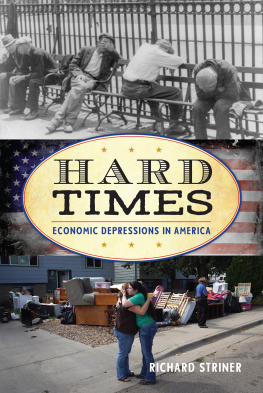
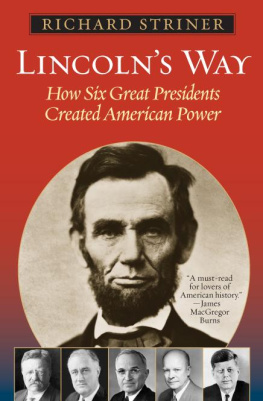

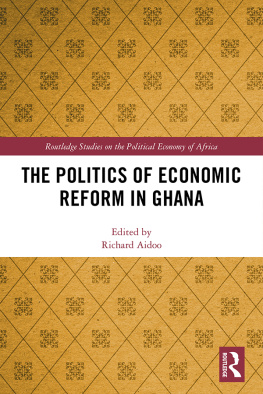
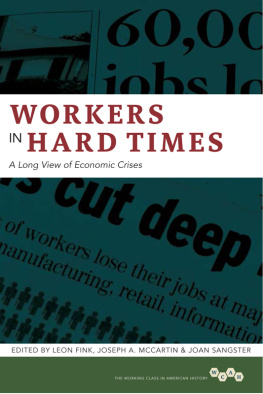
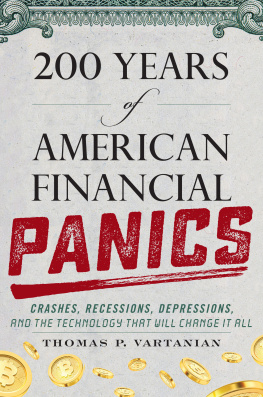
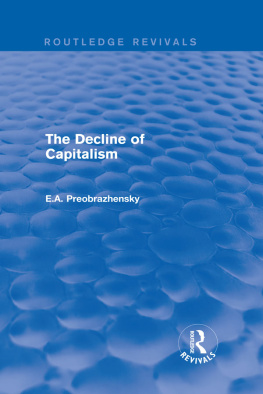
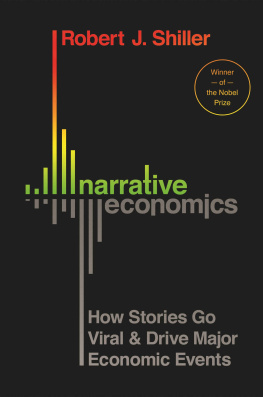
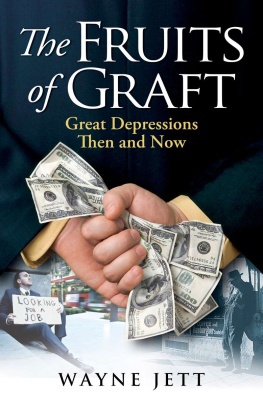
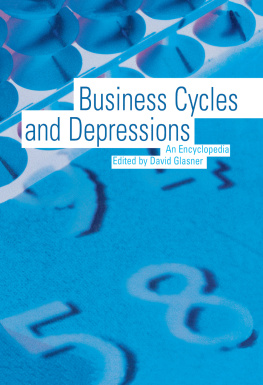
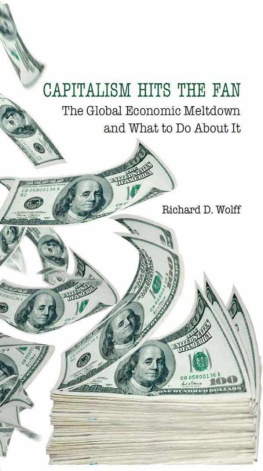

 The paper used in this publication meets the minimum requirements of American National Standard for Information SciencesPermanence of Paper for Printed Library Materials, ANSI/NISO Z39.48-1992.
The paper used in this publication meets the minimum requirements of American National Standard for Information SciencesPermanence of Paper for Printed Library Materials, ANSI/NISO Z39.48-1992.